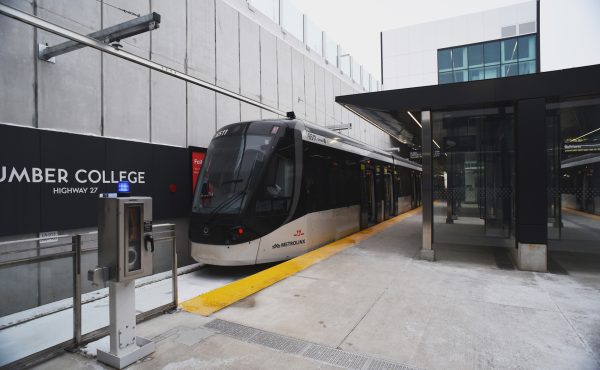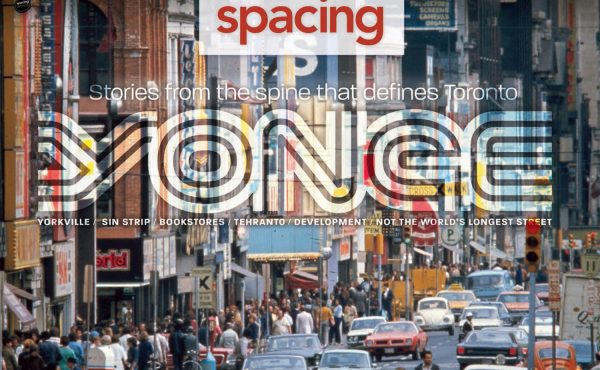
Cross-posted from Eye Weekly’s Ontario Election 2007 blog.
This morning’s press conference to launch Mayor David Miller’s campaign to garner increased public support for new taxes included tough questions from the many reporters in attendance. Here’s a transcript of the Q&A portion of the event.
Media: Are you saying that if an emergency meeting is called and you pass the taxes that all the service cuts that you announced last month will disappear?
Miller: Not quite, no. But if the taxes are adopted so that they can be implemented simply, it will mean that they will be implemented much faster, so we should be able to reverse a number of the cuts.
Media: Were the cuts then a means to convince the public that these taxes are needed?
Miller: No, it’s a real fact: this city government cannot run a deficit. As you know, we are managing our budget using our reserves like Ottawa and other cities are. Without the assurance of the new revenues, Shirley Hoy and her management team had to manage the actual funds [i.e. make cutbacks] and that’s why it’s important to reopen the question [of the new taxes]. If it’s not reopened, we’ll debate them again in October, but the taxes will not be implemented in January if the debate is in October; that’s the challenge.
Media: Generally speaking the New Democrats offer the most uploading and many of the things that Toronto wants. I’m wondering why you don’t just throw your support behind Howard Hampton and the New Democrats?
Miller: All three party leaders have made commitments. The New Democrats have made specific commitments that are very positive. The premier has made an announcement that he’s actually implementing and has indicated that when the review is over, he’ll be taking further steps. John Tory has indicated he’ll expedite the review. From my perspective the issue is simple — Ontario doesn’t succeed without Toronto. We need every single party to be supporting Toronto. The success of this city isn’t the success of the NDP or the Liberals or the Conservatives, it’s the success of Torontonians. I’m glad that all three parties have made commitments. Yes it’s true that on some details the NDP is better. On the other hand, the premier has actually already acted. We just need actions faster if the city is going to succeed.
Media: Do you think this campaign might be a little too late? Where was it three months ago?
Miller: Fair question. Obviously the vote got deferred and made this campaign necessary. But when I speak to Torontonians, they get it. Sometimes people are very busy and not paying attention to every detail, but they get it. And if you ask people involved in the provincial election, they’ll say city funding issues are coming up at the door and what people are saying is: solve the problem. Solve the problem. This is how we solve the problem. Not only that, it’s the start of building ways to actually invest in the city. So the provincial government announced funding for us to build our Transit City program, which will bring rapid transit to the neighbourhood of Scarborough that I was in last night. We don’t have the money to run it. That’s what this will do, along with proper uploading and proper action by the federal government. We know the province and the federal government have to give the city more money, but it’s time to act. It’s time for this council to act; it’s time for this council to come together and act in the best interest of Torontonians.
Media: Obviously you’re having a hard time raising taxes. What about relying more on user fees?
Miller: I think you have to be extremely careful with user fees for things like recreation services. Parks and recreation, for several years, has not been able to bring in the amount of money predicted by user fees. [User fees] also have a very unfair impact on families that can’t afford them. Also, the vehicle registration tax is really a user fee. We’re going to apply the money to roads and transit, so by paying a little bit more to register your car, you will end up with less gridlock and better roads, so in a way that’s a user fee. One of the reasons we went to the new garbage system is to take it off property taxes. This is all part of a systematic way to try to lessen our reliance on property tax and ensure we have the money for services people want. Water is already self-funding, garbage will be self-funding; I’m not sure there are any [other] big measures like that that would make a huge impact.
Media: What assurance can you give that these taxes will actually go into maintenance and the expansion of services?
Miller: These funds are needed to invest in our city. In the short term, they’re needed to stabilize the city’s budget. Torontonians don’t always realize that for 10 years this city hasn’t been set up financially the right way — ever since amalgamation. These taxes will help. We have extremely low administration costs at the City of Toronto; all of our money goes into direct investment. With the vehicle registration fee, the recommendation was strictly earmarked for roads and transit and related services. I support that. That’s what the money’s for. If we’re able to achieve a reasonable uploading a little bit faster than the parties have promised, the land transfer tax will be used to invest in things like Transit City.
In the short term next year, the bulk of [the new taxes] will go to shoring up our budget, that’s why we had to make the cuts this year. People want these services. You hear it over and over and over again. We didn’t hear that voice in July; members of council heard from realtors. We now we’re going to hear from real Torontonians. That’s what this campaign is all about.
Media: A few weeks ago, you rejected the idea of a special council meeting. Now you’re holding a rally in support of a special council meeting. Can you explain the dramatic change in your strategy?
Miller: It’s hasn’t changed whatsoever. The council meeting I’m talking about is one to reopen the decision about the taxes. All of these members of council supported not deferring. They all knew when they voted on the issue that a deferral would mean some difficult decisions by the city. That’s why it’s extremely consistent. The only change is that more members of council have indicated that they’re prepared to consider a reopening.
Media: But you were prepared to wait until October until very recently.
Miller: I was never asked a question to reopen the tax issue. You’re talking about a special meeting to debate the cuts. That I did not call.
Media: When are you going to know if you have the two-thirds support you need to reopen the debate?
Miller: In the next few days.
Media: You have a divided council. What are you going to do to reach out to the other side to get this through for the betterment of everyone in the city?
Miller: Well first of all I’m in contact with councillors regularly; that’s my job. And the city government isn’t a party system. There are a few members who treat it like that, but it isn’t. And if you look at the very same day [as the vote to defer the vote on the taxes], our climate change strategy was passed unanimously by council and there were other controversial votes that were passed by two-thirds. Yes, this was a tough issue. It’s a very difficult thing to go to people and say I want to bring in a new tax. It’s very hard. It doesn’t make you popular. But this isn’t about popularity; it’s about the future of our city. I believe the vast majority of council understands that.
Media: Do you think the choices were articulated clearly to the public? If a year ago you said to them, “Listen, these are the choices; community centres will close if we don’t find new sources of revenue,” do you think you would have more public support than you do now and less public outrage?
Miller: It’s hard to go back. I do know that when I said on television that if these measures weren’t passed, the consequences would be serious, I was accused by some members of council of fear-mongering. Let’s look at the big picture here. This was a deferral because a number of members of council thought strategically that it would be a good way to put pressure on the province. Well, the result is we have three provincial parties that are all supporting cities, not nearly enough for Toronto now, but they’re all supporting it. Hindsight is hindsight. All I do know is that by Torontonians speaking up, they’ll have a strong impact. People are now able to say to their councillors: we want to live in a great city, we want services, support these new services because they’re fair, they’re much fairer than property tax hikes.
Media: Given the way things have gone, are you going to change your approach to council? Do you accept responsibility for the deferral vote?
Miller: I accept all responsibility. Whatever happens in this city is my responsibility as mayor and I very much regret the deferral because of the consequences. I do my best to work collegially with council. Many of them I’ve served with for a long time, sat beside them for a long time and that’s how council works. For the most part it’s not a government/opposition kind of system; it’s people who work together and on different issues they’re on different sides. If I’m deserving of criticism that’s fine, but I’ll continue to work that way because I think that’s the way you should work. It’s an open, co-operative government.
Media: We’ve heard you say several times that you had no choice but to cut services, but the perception is that this didn’t have to happen, that efficiencies can be found.
Miller: We’re being straight with people. These are the facts. The city government cannot borrow money to fund its operating budget. That’s the fact. And we’re in a very difficult circumstance and anyone who’s been around here for any time knows it. Anyone who covers our budget knows it. They know that our budget this year was financed in a way that isn’t sustainable. That’s what these new taxes are all about, in addition to allowing us to invest in Toronto. Delaying them has caused a gap. That’s the position we’re in.
Media: The conference board of Canada came out with a report today that found that the fastest-growing cities are in western Canada and that Toronto is short of meeting its economic potential. Is this related to that?
Miller: Yes. If we’re going to achieve our economic potential, the biggest single issue for businesses in this city is transportation. The board of trade said that last week. The biggest thing we can do to address transportation and gridlock is build our Transit City plan. The province has announced funding to build it. We don’t have any money to run it. That’s what these taxes are all about. It’s about the prosperity of Toronto and making sure that prosperity is shared with every neighbourhood.




2 comments
Dale. Thankyou for following this really important city-building story.
I think Mayor Miller made a mistake by not keeping citizens informed. He underestimated us and now he needs to go back and bring us up to date. He is providing information that we did not have about taxes and services. I hope he doesn’t makes this mistake again.
Miller: Yes. If we’re going to achieve our economic potential, the biggest single issue for businesses in this city is transportation. The board of trade said that last week. The biggest thing we can do to address transportation and gridlock is build our Transit City plan. The province has announced funding to build it. We don’t have any money to run it. That’s what these taxes are all about. It’s about the prosperity of Toronto and making sure that prosperity is shared with every neighbourhood.
I think that the BOT was referring to this
Traffic jams from 416 to 905
The governments own statistics, the Cordon Count, align with this Toronto Star story.
The 2006 tally of cars travelling designated roads in Toronto and surrounding region shows non-traditional commutes are increasingly the norm with relatively fewer cars heading into the city’s core, or central business district, and more of us heading to jobs in the suburbs or the 905 communities, often skirting Toronto’s borders altogether.